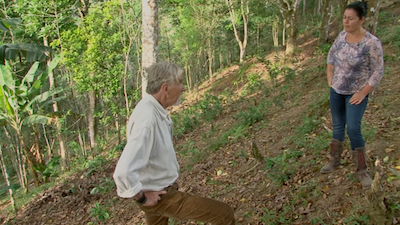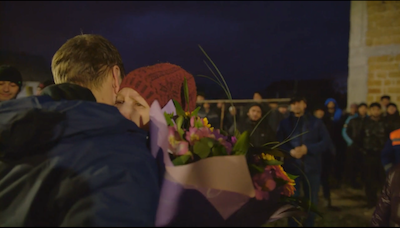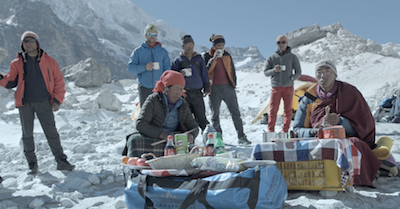20e Festival international Signes de Nuit - Paris / 1-10 octobre 2022
9 |
|

| Mirror |
| Ayena |
| Siddhant Sarin, Debankon S. Solanky |
| India / 2022 / 1:10:00 |
A momentary act of revenge transformed the lives of two young Indian women forever. After surviving an acid attack, while carrying scars of human brutality on their face, both Ritu and Faraha learn to redefine their lives through a sea of odd currents daily. Strangely enough, Ritu’s scars also brought her some fame, she occasionally finds herself talking on television, modelling at fashion events, or featuring in a Bollywood film… still, she often feels lonely. She wants to be loved and embraces an ambiguous relationship with a fellow female acid attack survivor. On the other hand, Faraha has come to terms with her post-attack singlehood and her new lease of life. As she begins to enjoy the freedom and independence, a desire to become a mother slowly brews within her. By intertwining the shadows and lights, and hope and hopelessness in Ritu and Faraha’s life, Ayena becomes a mirror where we can also see our own reflections.
|
|

|
Jury Declaration:
The documentary ‘Mirror’ closely observes the lives of some acid attack survivors in India. The storytelling is simple, yet goes with well-conducted research. The narrative never seems slow-paced as it deals with some kind of rawness. It never falls short of reality even if the subject is not easy to handle. In the end, one brutal thought resonates, even though the patriarchal society tries to show pity on these acid survivors, would these girls ever be able to trust anyone in or out of their family? Would the judicial system ever be able to punish the criminals behind this?
|
SIGNS AWARD
The Signs Award for Documentary honors films, which express in an original, convincing and sensitive way the perturbing aspects of reality.
|
| Ninosca - The Woman and the Emigrant's Song |
| |
| Peter Törbiörnsson |
| Sweden / 2020 / 1:44:00 |
This is a film about a woman’s struggle for independence that requires her to face her past in the machismo culture of Central America. It is a single stand-alone documentary, and the third and concluding film in director Peter Torbiörnsson’s trilogy that started with The Lovers of San Fernando (2001) and was followed by The Last Chapter (2011). Peter has followed Ninosca during 40 years, through marriage and becoming a mother, the decision to leave Nicaragua and her family and move to Spain to be able to put food on the table and for her children to go to school – but also to escape her violent husband. Once in Spain, Ninosca is refused residence permit and she is unable to go back to Nicaragua. Her children are denied entry to Spain and they remain separated for more than seven years. Ninosca becomes one of Europe’s many undocumented immigrants. In the film we follow her intimately in her everyday struggle. Her dream is to return to Nicaragua, to reunite with her children, buy a piece of land and a small coffee plantation. She wants to return to her home village, revisit her brothers and relatives but at the same time she fears meeting her ex- husband, who has threatened to kill her if she ever comes back.
| |

|
Jury Declaration:
Through an intimate cinematography that captures the passing of time and reflects the trust built up over a lifetime, we are invited to follow a woman’s relentless fight for a dignified life. Ninosca is a sad but powerful song about social injustice and the weight of patriarchy in Latin America. A magnificent register of a human life but also the larger story of class hierarchies, migration and imperialism.
|
NIGHT AWARD
The Night Award for Documentary honors films, which represent reality in an ambivalent and enigmatic way, avoiding stereotypes of representation and simple conclusions.
|
| Churchill, Polar Bear Town |
| |
| Annabelle Amoros |
| Polen, Germany, Switzerland / 2020 / 1:34:0 |
Every year in northern Canada, polar bears migrate to Hudson Bay to hunt seals. From October to November, while waiting for the ice pack to form, they take up residence on the outskirts of the town of Churchill. Hunted for a long time and now the stars of safaris, the bears have become a tourist attraction and therefore a considerable source of income for Churchill.
|
|

|
Jury Declaration:
Polar bears come every year to hunt seals in Churchill, Northern Canada. The film reflects splendidly the atmosphere of the town, between fear of dangerous animals, curiosity, lucrative business with tourists, all in a bluish white tone. By turns contemplative and dynamic, not without humor, it also points out the consequences of climate change.
|
| Children of the Border |
| Rajan lapset |
| Janne Vasarainen |
| Estonia / 2022 / 0:16:20 |
It would be conforming to say that we are facing “unprecedented times” in Europe, but it would be dishonest to state so. The Russian Federation has attacked sovereign Ukraine and shook the whole balance of Europe. The news is full of stories from the spot. War does not affect only the soldiers on the field, but the side effects cover vast entities; international organizations, state officials, rescue workers, volunteers. But the smallest denominator of war is often a child. This smallest piece of the puzzle is unable to understand the entire reality of which it is a part of. Their experience consists of short moments, full of unclarity, sadness and often even happiness. The film tries to depict what goes around in the heads of these children, as we follow through the lens a bus full of Ukrainian refugees fleeing towards Finland. To get a better understanding of what a young individual goes through in such a hectic event, we hear stories from ones who have experienced it all - old Karelians. Karelia province was a large part of Finland until the Second World War, during which it was evacuated twice, second part being the last time many of its’ residents saw their homes for good. In the eastern parts of Karelia, the evacuation often took place with an hour's notice, when the enemy was already storming through the borders. This caused people to hit the road quickly, their life packed only in bags they could carry by themselves. This has happened before, and it happens now. The stories dating back almost 80 years are not that different from the reality we are seeing now. These two levels of the film create a third one, running deeper in symbolism. The similarities grow through the story, and the viewer might get a glimpse into the mind of an Ukrainian refugee child, even though they are saying very little.
|
|

|
Jury Declaration:
Jane Vasarainen’s film “Children of the Border” represents the fragments of lives of refugees who were made to hit the road quickly. It shows the parallels between the Ukrainian refugee children who are fleeing in a bus after the Russian Federation attacked Ukraine and old Karelians, who were evacuated from their homes when the Red Army invaded Southern Finland territories during two wars in the beginning of the XX century. The jury would like to mention the quick and fair response which the author gave through poetical and semantic sequences to the situation which happens here and now, but actually was happening with people affected by the wars many times before.
|
Director Statement:
I'm very grateful to hear that my film "Children of the Border" has received the Jury award from Signed de Nuit festival. I went through an array of feelings while filming it, and I hope the audience also immersed themselves with the film's flow and had time to observe their emotions.
The biggest acclaim belongs to the subjects of the film, that are either going through or have already experienced an enormal change in their lives and are still processing it decades later. I wish my film makes it clear that we cannot let them go through this alone. We need to realize the effects of the conflict won't be over even when the war hopefully ends as soon as possible.
|
EDWARD SNOWDEN AWARD
The Edward Snowden Award honors films, which offer sensitive (mostly) unknown information, facts and phenomena of eminent importance, for which the festival wishes a wide proliferation in the future.
|
| Tomorrow Comes Yesterday |
| |
| Kirsten Gaine |
| Russische Federation / 2022 / 1:10:55 |
In 2014, after Crimea was annexed into the Russian Federation, the country authorities began a genocide against the peninsula’s indigenous people, the Crimean Tatars. Many men were arrested and convicted in trumped-up terrorism cases. Women whose husbands and sons were imprisoned fight for justice, and their children have to become adults ahead of time. Grief unites the entire nation, but every year the authorities arrest more and more Crimean Tatars.
|
|

|
Jury Declaration:
Kirsten Gainet’s film “Tomorrow Comes Yesterday” documents the repressions of the Crimean Tatars, which started in 2014 when Russia annexed Crimea. The film investigates the tragedy of the representatives of a small Turkic Muslim ethnic group and nation indigenous to Crimea, that never made the international headlines. The jury would like to mention the respect and tenderness with which the film tells the stories of the families who are fighting for the release of their sons, brothers and husbands who were arrested for invented reasons and either kept behind bars or sentenced after closed trials.
|
| The Wall of Shadows |
| |
| Eliza Kubarrska |
| Polen, Germany, Switzerland / 2020 / 1:34:00 |
The Sherpa family break a taboo and take part in the Himalayan expedition to Kumbhakarna,the holiest of mountains, to earn money for their son's school and cut him from their tradition. They accompany the leading world class alpinists.
|
|

|
Jury Declaration:
"Wall of Shadows” invited to particpate in a journey in the middle of the Himalayan mountains in the heart of a Sherpa family. The faces are very familiar and endearing to us, filmed in a very close, intimate and very fictional way. We are carried away in a majestic setting with beautiful shots of Kumbhakarna mountain, which bears the name of a giant demon in the local mythology. A very difficult summit to never reach… It requires a lot of effort to live and survive in this harsh and at the same time grandiose world.
|
'
| Edna |
| |
| Eryk Rocha |
| Brazil / 2021 / 01:04:14 |
Living on the edge of Transbrasiliana highway in the Brazilian Amazon, Edna is a witness of a land in ruins built upon massacres. Raised only by her mother, she experiences in her body and hers descendants, the marks of a "war that never ends" - a war for land. Through her reports and writings, the movie builds an hybrid narrative that moves between reality and imaginary. Everything's woven from Edna's memory and her diary entitled "Story of My Life".
|
|

|
Jury Declaration:
“Edna” offers a sensitive portrait of a courageous woman, resisting the Brazilian dictatorship, the deforestation and confiscation of land in the Amazon. Her destiny is closely linked to the history of this territory, past and present coexist on the same level. The black and white photography is particularly rich and opens up to color at the end, to exalt the yellow of a flower, to recall the red of the fires - an evocation of reality but also of hope .
|
Director Statement:
I'm thrilled to know that EDNA received the Special Mention Award at Festival Signes de Nuit. This is a great honor to me and I'm so happy about the beautiful trajectory the film is doing internationally. Also, I would like to point out that I loved the beautiful statement that the jury wrote about the film! Thank you so much for this.
|
MENTION FOR THE NIGHT AWARD
|
| Eami |
| |
| Paz Encina |
| Paraguay / 2022 / 1:23:00 |
Eami means ‘forest’ in Ayoreo. It also means ‘world’. The indigenous Ayoreo-Totobiegosode people do not make a distinction: the trees, animals, and plants that have surrounded them for centuries are all that they know. They now live in an area experiencing the fastest deforestation on the planet. Paraguayan director Paz Encina travelled to Chaco for this film. She immersed herself in Ayoreo-Totobiegosode mythology, and listened to heartrending stories about how the people are being chased off their land. Based on the knowledge she acquired, she made a dreamy, magic-realist film about a little girl called Eami. After her village is destroyed and her community disintegrates, Eami wanders the rainforest. She is the bird-god – she explains in the poetic voice-over, in her own language – looking for whomever may be left. Every now and then, Encina plays snippets of interviews, whilst studying Eami’s immobile face. Eami will have to live outside the rainforest, just like the coñone (literally: ‘the insensitive’). Encina turns her final wander into an experience for all the senses, with enchanting images and a powerful sound mix. A bird screams. The wind rustles the leaves. Something growls in the distance. Then: machines. Panic. EAMI is an indictment; yet, perhaps even more so, an attempt to record something that will be lost. ‘Remember everything,’ says the lizard/old man who accompanies Eami on her journey. ’Once we leave, we can never come back.’
| |

|
Jury Declaration:
A demanding film, at the same time sensory, dreamlike and realistic, with images of great beauty, precise framing, hypnotizing still shots. A fascinating and poetic universe (reminiscent of the cinema of Weerasethakul), for this journey into the forests of northern Paraguay, devastated by deforestation, through the voice of a little girl, tells the tragedy of this exile without return, the end of a world hitherto preserved from the damage of civilization.
|
|
|
|